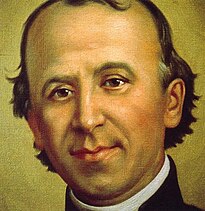Paul Joseph Nardini
| Bl. Paul Joseph Nardini, T.O.S.F. | |
|---|---|
 |
|
| Father of the Poor Priest and Religious Founder |
|
| Born | 25 July 1821 Germersheim, Palatinate Kingdom of Bavaria |
| Died | 27 January 1862 Pirmasens, Palatinate Kingdom of Bavaria |
| Venerated in | Roman Catholic Church |
| Beatified | 26 June 2006, Speyer, Germany by Pope Benedict XVI |
| Major shrine | Convent of the Poor Franciscan Sisters of the Holy Family Pirmasens, Germany |
| Feast | 27 January |
The Blessed Paul Joseph Nardini, T.O.S.F., (25 July 1821 – 27 January 1862) was a German diocesan priest and the founder of the religious congregation of the Poor Franciscan Sisters of the Holy Family, also commonly known as the Nardini Sisters, or the Mallersdorfer Sisters from the town where they are now headquartered. He was beatified in 2006 by the Catholic Church.
Nardini was born at Germersheim in the Palatinate, then part of the Kingdom of Bavaria, to Margareta Lichtenberger, an unwed mother who gave him the name Paul Joseph Lichtenberger at his birth. The name of his father, an Austrian military engineer, has remained unknown. According Dr. Norbert Weis, postulator in the beatification process of Paul Nardini, records suggest that Austrian aristocrat Joseph Zocchi of Morecci was likely his father.
Margareta was unemployed and thus not able to provide for herself and her son. After two years of living in deep poverty, she turned her son over to her paternal aunt, Maria Barbara Lichtenberger, who was married to Anton Nardini. The couple adopted young Paul and gave him their own surname. They loved the boy and raised him as if he had been their own son, providing him with the best education possible.
Nardini displayed extraordinary diligence in his studies and earned excellent grades. In so doing, he drew the attention of several teachers. After he completed grammar school, it became clear that Paul was interested in the priesthood. The Bishop of Speyer, Johannes von Geissel, had him admitted to the seminary at Speyer, where Nardini studied philosophy from 1841 through 1843. Upon completing his philosophy studies, he was sent to the Ludwig Maximilians University of Munich by Geissel's successor, Nikolaus von Weis. There, Nardini obtained a degree in theology, and graduated summa cum laude. His professors encouraged the young scholar to stay at the University, where he could be assured of a successful career, but he was determined to serve as a parish priest.
...
Wikipedia
